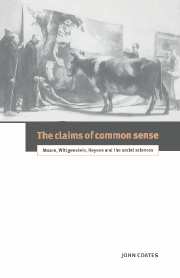Book contents
- Frontmatter
- Contents
- Preface
- Introduction
- 1 A short history of common sense
- 2 Ideal languages and vague concepts: the transition in Cambridge philosophy
- 3 Keynes and Moore's common sense
- 4 Keynes's later views on vagueness and definition
- 5 Samples, generalizations, and ideal types
- 6 The Cambridge philosophical community
- Conclusion: complexity, vagueness, and rhetoric
- Index
6 - The Cambridge philosophical community
Published online by Cambridge University Press: 19 September 2009
- Frontmatter
- Contents
- Preface
- Introduction
- 1 A short history of common sense
- 2 Ideal languages and vague concepts: the transition in Cambridge philosophy
- 3 Keynes and Moore's common sense
- 4 Keynes's later views on vagueness and definition
- 5 Samples, generalizations, and ideal types
- 6 The Cambridge philosophical community
- Conclusion: complexity, vagueness, and rhetoric
- Index
Summary
The similarities between Keynes's and Wittgenstein's later views on language and vagueness are striking. The textual comparison of the previous chapters thus helps explain many of Keynes's unorthodox preferences in model building. But the influence of Wittgenstein on Keynes has been doubted by some biographers, and largely ignored by others. However, I do not believe the whole story has been told of Keynes's friendship with Wittgenstein in particular, and his involvement with later Cambridge philosophy generally. When this story is sketched in we can see that Keynes was following the new philosophical ideas more closely than has been appreciated.
In the existing literature on Keynes it is often argued that his views on method and the general outlines of his philosophical position were set in the early twenties, at the time of his Treatise on Probability. Anna Carabelli, for example, argues that “Keynes's own economic methodology had its roots in that early work” and that “on this aspect [he] seemed not to have changed his mind.” Furthermore, in the historical and biographical work on Cambridge philosophy there has been very little written specifically on Keynes's friendships with Ramsey and Wittgenstein, and more generally on the fruitful collaboration between the economists and the philosophers. And what little has been written underestimates Keynes's involvement with the later philosophical ideas. Ray Monk claims that Wittgenstein's friendship with Keynes was confined to purely practical affairs shortly after his return to Cambridge in 1929, that there was little intellectual rapport between the two, that Wittgenstein even had a low opinion of Keynes's understanding of philosophy. These claims, of course, are not inconsistent with the possibility that Keynes was greatly influenced by Wittgenstein.
- Type
- Chapter
- Information
- The Claims of Common SenseMoore, Wittgenstein, Keynes and the Social Sciences, pp. 121 - 146Publisher: Cambridge University PressPrint publication year: 1996



